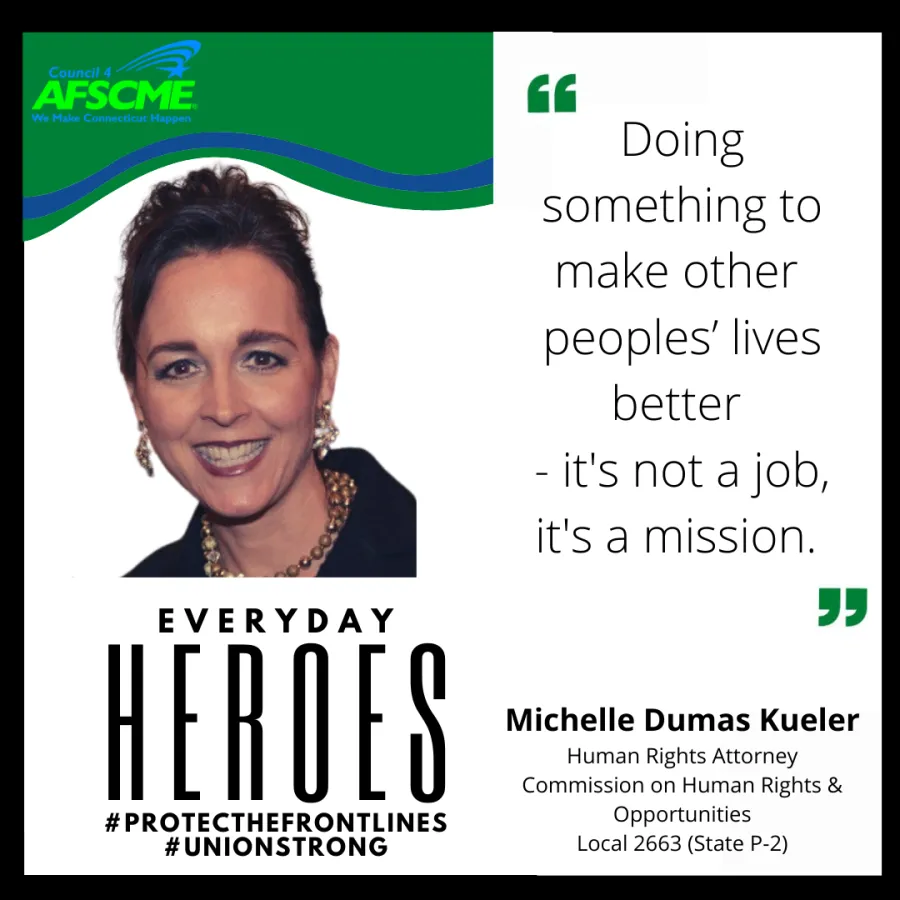Council 4 Member Advances Human Rights For All CT Workers

It would be an understatement to say that 2020 has been a pivotal year for civil and human rights. The Supreme Court declared that employment discrimination based on sexual orientation and gender identity was unlawful. The killing of George Floyd ignited a wave of protests around systemic racism. And in Connecticut, employees everywhere participated in sexual harassment training and education.
At the center of it all is Connecticut’s Commission on Human Rights and Opportunities (CHRO), an agency whose staff is represented by Council 4. Whether it is discrimination in employment, housing, public accommodation, credit practices, affirmative action hiring by State agencies, or fairness in state contracting, CHRO enforces civil rights statues in the state. It is one of the oldest state-based agencies of its kind in the country.
“CHRO is on the forefront of protecting people’s rights,” said Michelle Dumas Keuler, a human rights attorney with the Commission for 15 years. “It’s difficult for people to talk about discrimination. It’s hard for them to file complaints and is a very difficult subject to grapple with. The Commission has done a lot of education and outreach to help people understand that these laws exist to protect them if they have been discriminated against and to help them file a complaint.”
Dumas Keuler, a member of Local 2663 (P-2 Social and Human Services Bargaining Unit), works in the Legal Division. Roughly 2,400 complaints a year are filed with CHRO and subsequently investigated. If there is reasonable cause to believe that discrimination took place, the state has an interest to make sure it does not continue.
Dumas Keuler prosecutes cases on behalf of those filing discrimination claims. She also works with staff who work on legislative matters to ensure civil rights language continues to develop in our laws.
“We want to be as impactful as possible to make sure that [Connecticut state] statutes are reflective of most protections they can provide,” explained Dumas Keuler. “Not everything can be done through case law. It is eye opening how the whole [legislative] process works.”
Many know about CHRO because of its Sexual Harassment Prevention Training that is required by law for employers with 3 or more employees. The training developed by CHRO came about in the Time’s Up Act which passed in 2019 as a result of the Me Too movement. Besides establishing requirements for sexual harassment training, the law also expanded workplace protections such as prohibiting retaliation for those who filed harassment claims. Over 200,000 people have taken this training.
“It is quite an undertaking when you think about the endeavor to have to train practically every [Connecticut] employee,” said Dumas-Keuler. “Not a day goes by where people aren’t requesting the training because people need it and want to take it. I’m proud of the legislature and Commission for bringing it all together even though life has been turned upside down [due to COVID-19].”
The COVID-19 pandemic has changed not only the way CHRO operates internally, but also the ways they conduct outreach and in the types of employment cases coming through. They have hosted a number of webinars that touch on the intersection COVID and the disparities it has exacerbated in healthcare, disabilities, education services for those with disabilities, and access to Section 8 housing.
According to Dumas Keuler, COVID-related discrimination claims have run the gamut from retaliation and layoffs of COVID positive employees to employees with co-morbidities not returning to work for fear of exposure. What remains to be seen is how the law will interpret COVID as it relates to disability protections.
“It is an unsettled area,” said Dumas Keuler. “COVID may or may not be a disability to have coverage under the law. The flu isn’t a disability, but if you end up having scaring in your lungs and makes it difficult to breathe, that likely is a disability. The courts have a backlog due to COVID that must be processed before the law around these cases can be interpreted. There isn’t guidance that exists.”
Witnessing the myriad of challenges workers face throughout the pandemic has reinforced for Dumas Keuler the benefits of the union. Being a member of Local 2663 has aided her navigation of litigating state cases by “adding an element of understanding” where other state worker union members are coming from. She also recognizes the magnitude of “guardrails” and “mechanisms” laid out in union contracts that protect and can help remedy workers from mistreatment.
“The benefits, retirement, and job security that comes along with working for a state [unionized] agency are really invaluable,” said Dumas Keuler. “When [the Supreme Court’s decision in] Janus came through, I don’t know anybody who left the union when given opportunity to. Everyone stayed because they see the value of the union.”
Dumas Keuler does not shy away from being recognized for doing her “life’s work.” After listening to one of the training videos, a friend reached out to say he heard her voice featured on the recording. She proudly responded, “Now you know what I do all day.”
For Dumas Keuler, “It’s not a job, it’s a mission. I feel very blessed that I am doing something to make other peoples’ lives better. I work with amazing people who have an incredible commitment. It’s so cliché but I am honored to work with them.”
